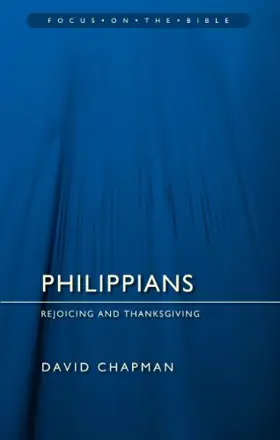

Philippians: Rejoicing and thanksgiving
Pages
288
Publisher
Christian Focus
Published
5/14/2012
ISBN-13
9781845506872
The Apostle Paul has a deep-seated joy in Christ. He is content whether he is in want or plenty and yes even in the face of great suffering and persecution. His life exemplifies what it means to live a Christ-like life full of devotion and joy. There is no better place to go to find an autobiography and indeed the theology of Paul than the book of Philippians. It is here we see his focus on Christ and his pastoral concern and spiritual feeling for the people at Philippi. David Chapman skilfully unpacks the book of Philippians and provides us with some personal reflection questions which help us to apply it to our lives. “My prayer is that the reader will better know and serve our Lord through considering anew Paul’s letter to the church in Philippi.” David Chapman
Reviews
David Chapman is a world-class scholar. (His works on crucifixion are some of the best published today.) In this commentary, his skills as a scholar, and his ability to communicate in a non-scholarly way, are both on clear display. The result is a superb commentary with numerous strengths.
- It is written very clearly. There is a minimum of technical jargon, and the prose is lucid and easy to follow.
- It is well-researched and yet non-technical. It is very clear that Chapman has interacted deeply with the Greek text, yet he explains things in such a way that those who do not know Greek are able to follow along and understand. He also provides “Additional Notes” at times that go into further discussion on debated issues present in the secondary literature.
- It is concise. It does not get bogged down in discussion of the secondary literature. It is certainly aware of the discussion (see previous point), and those familiar with the debates will see Chapman providing support for where he lands on various issues, but he focuses on the text itself and how it should be understood.
- It is pastorally sensitive. The commentary series he is writing for does not intend for commentators to have in-depth discussion of matters of application, but Chapman provides guidance in such matters all along the way. The commentary does not go more than a page or two without pausing in some way to help the reader think of what the implications of the letter are for Christian living today.
In short, this is a well-researched commentary that will give you a clear explanation of the text in a pastorally sensitive way. It will provide guidance in terms of debates in the secondary literature without getting bogged down in the details. In terms of a concise and lucid explanation of Philippains, it will be hard to do better.
